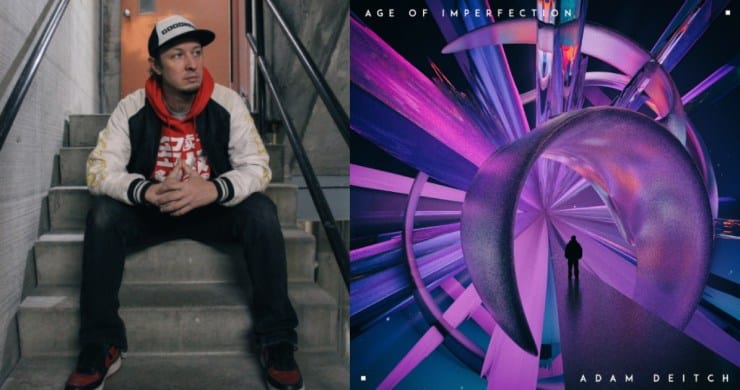GOLDEN WOLF: Adam Deitch On The Philosophy & Methodology Behind ‘Age of Imperfection’ [B.Getz on L4LM]
original feature found on Live for Live Music HERE
Adam Deitch has been a producer for just about as long as he’s been behind the drum kit. An ardent student of golden era hip-hop since his Nyack, NY youth, he’s got a special appreciation for the processes and philosophies that inform the seminal sound design of classic rap production. A master of emotional instrumental collages across myriad musical projects, the erstwhile veteran is back from the lab with a phenomenal nine-track EP, Age of Imperfection. His latest offering is a solo production, released August 19, 2020 on Golden Wolf Records.
As drummer/co-founder of future-funk squadron Lettuce, his world-renowned prowess is similarly rooted in a classic breakbeats/funky hip-hop ethos. As one-half of electro-soul/future-bass duo Break Science, Deitch has evolved into a confident co-captain for the colorful galaxies of electronic soundscapes. The drummer even put iconic jazz guitarist John Scofield onto jungle-break riddims and electro-funk textures, pushing the visionary Uberjam band to new frontiers at the dawn of the millennium. Years later, Deitch learned to deftly connect EDM elements and boom-bap steez by working and playing with Pretty Lights and driving the Analog Future Band.
Over the years, Deitch kept unveiling different versions of his producer personality. Releases from the Fyre Dept. era, the Late Night Collection volumes, I Get a Rush, or Sky’s Alive do not really traverse the same paths, nor tread similar waters. On Age of Imperfection, Deitch continues to seek out brilliant landscapes for sonic exploration, steadily injecting his trademark emotional quotient into these intoxicating compositions. The album was mastered by Gramatik and again offers a futuristic feel, but unlike its predecessor, the record leans away from flowing pastels and pristine desert 808s. Instead, Age of Imperfection nods it’s dusted head back toward the Native Tongues, New York City, and the 1990s, juxtaposed with a lysergic dash of Front Range lo-fi psychedelia to boot.
Earlier this summer, L4LM’s B.Getz tracked down Adam Deitch via phone to discuss the muses, magic and motivation that inspired him to create his latest solo release Age of Imperfection. Read a transcript of the Age of Imperfection conversation below, edited for length and clarity. You can listen to the full conversation with Deitch on Episode 032 of The Upful LIFE Podcast.
Live For Live Music: On the SofaKing Fest livestream back in the spring, a lot of that performance was material many of us have never heard, but you took the opportunity to announce your forthcoming solo record, Age of Imperfection. Now, in August we can finally dig into this project. What was the approach—beginning from a production standpoint, or a composition standpoint?
Adam Deitch: I’m a big fan of producers like J Dilla, Pete Rock, and DJ Premier. Those are my three main guys, and they have this very chill side sometimes… There’s this whole thing happening now with lo-fi hip-hop. It’s sort of a new term for basically what I call “the disciples of Dilla.” There’s a bunch of ‘em. The KOUNT, people like Otis McDonald, DJ Harrison, and others who are making this sort of lo-fi, funky, instrumental hip-hop stuff, with kind of chill overtones. And they’re not sampling records.
Live For Live Music: So are you not sampling on Age of Imperfection?
Adam Deitch: Nope. I’ve been sampling records for years, to get those sonics and to get those sounds. It finally dawned on me to try to get those sounds without sampling things, without sampling other people’s records. I decided to try and sample myself. To force myself to play bass on something, keep the keyboard track I play on the Rhodes, and I just build from there. Obviously, I can’t get the sound of a 60-piece orchestra in my house, because I don’t play violin. There are limitations, but I try to work within those limitations to create something original and something that has that dirty, a kind-of vinyl feel to it.
Live For Live Music: Ah, that sort of reverse-engineering, something that we’ve spoken about before. So what about when it comes to drums on these kind of productions?
Adam Deitch: I’m adding live drums to the stuff instead of adding something like VST drums. Even if I do use a kick drum from a sample pack, or something like that, I’ll overdub my live drums over it, so it has a combination of both. That’s really where I was going with this record.
Live For Live Music: With just about anything that you do—Break Science, Lettuce, and I’ve definitely noticed this with your solo productions—there’s an emotional quotient to the music, but it’s most often instrumental sound-art. I picked that up right away on the early listens to Age of Imperfection, and going back to Sky’s Alive and stuff, there’s just such an emotional aesthetic. You bring the heavy feels without lyrics. Where do you go to create that?
Adam Deitch: Well, I feel like music, the sound of notes, the sounds from instruments… they are universal. That’s why I call it [first single] “Space Dust”, because I’d heard someone say that “we’re all made of cosmic dust.” [I think] we’re all made of the same thing stars are made of, suns and moons, it is in our bodies too! There’s nothing more universal than that, you know what I mean? We are a piece of the cosmos. We are a piece of the universe.
Live For Live Music: Word. That’s why I asked, because I knew there had to be some real depth to the inspiration there, some conviction or idea that served as muse or motivation. Sometimes, lyrics steer the listener through a story or emotions, but instrumental music is like “choose your own adventure.” You do that extremely effectively across all of your projects
Adam Deitch: I kind of approach this record the same, like Lettuce and Break Science, where vocals are minimal, because language can be confusing sometimes. We have fans in Tokyo. We have fans in Brazil and Mexico and Germany and not everybody speaks English. How do you relate to people without speaking their language? It’s notes. It’s music. Hearing them sing the horn line or sing the synth melody, that’s deep. Because they don’t have to worry about translating the words. They can feel the meaning. They could feel what it means and where we’re going with it, without having to spell it out with lyrics.
I’m into expressing emotions through notes, through sounds, as opposed to spelling out a particular situation or involving poetic stuff with lyrics. That’s where I’m trying to go with this release Age of Imperfection. It’s kind of both bands. This music is in between Lettuce and Break Science. It has a little bit of the funk of Lettuce, and has a little bit of the electronics of Break Science. It’s sort of like this in between space that I like to live in when I’m off tour.
Live For Live Music: You mentioned about the bridge with Break Science and kind of being in between the two. You even reverse-engineered that project recently. The acoustic versions of a few of your tracks that you posted—Borahm on a baby grand and a little synth, and you’re on a small acoustic trap kit. How did you arrange the electronic music of Break Science in the minimalist, softer volume setting? And can we expect more of that?
Adam Deitch: The acoustic stuff, yeah, we definitely love doing that. We kind of fought it at first, because we come from the era of big bangin’ bass! We were on festivals with those kinds of artists like Tipper, Pretty Lights. At those shows, people like to have their brains and hearts twisted out with electronic bass, so we didn’t understand how our crowd would respond to this. We’ve got to send a shout out to Phil, our manager, for pushing us to do it, because the response was incredible.
It gives us a chance for people to see Borahm [Lee] play keyboards. He’s an amazing live piano player and synth player. He doesn’t need to sit there for hours and program it, he can just play it. My drum style, I could go between a jazzy or funkier thing and playing like a machine. I’ve studied how to play like a machine, for years. I like to go between that. You could definitely look forward to us doing that acoustic thing again.
Live For Live Music: Music is what obviously brings us together, no matter what is happening with life. Would you please kindly pick some artists that are getting you through these strange times? Or you want to put your fans on to?
Adam Deitch: I’ve been posting a lot of stuff on my Instagram. I’m digging super hard for rare soul and funk. I’m discovering old bands that I just never heard before. Everyone should check out the Skull Snaps, for old school stuff. If you dig that old school soul-funk, check out the Skull Snaps. When you hear them, you’re hearing exactly where we want to go sonically with Lettuce.
Then, I’m listening to a lot of The KOUNT. He’s a guy that’s producing, making all his loops himself, and just doing everything by himself. He’s playing keyboards. He’s playing percussion. He’s playing drums. Everything. If you follow him on Twitter, you’ll see it and hear it. You can see on there, he does videos where he shows you the process of how he records his stuff, which is totally eye opening for me, just watching how he does it. Check out The KOUNT.
Of course, DJ Harrison, what he’s doing on his own is incredible. Plus, the work he’s doing with Butcher Brown is getting heavier and heavier. He’s someone to watch. As a producer, he’s like a future Quincy Jones. That’s sort of like the new school stuff that’s going on.
As told to B.Getz
Listen to the new Adam Deitch record, Age of Imperfection, on the platform of your choice here or stream it via Spotify below:
Adam Deitch – Age of Imperfection – Full Album


